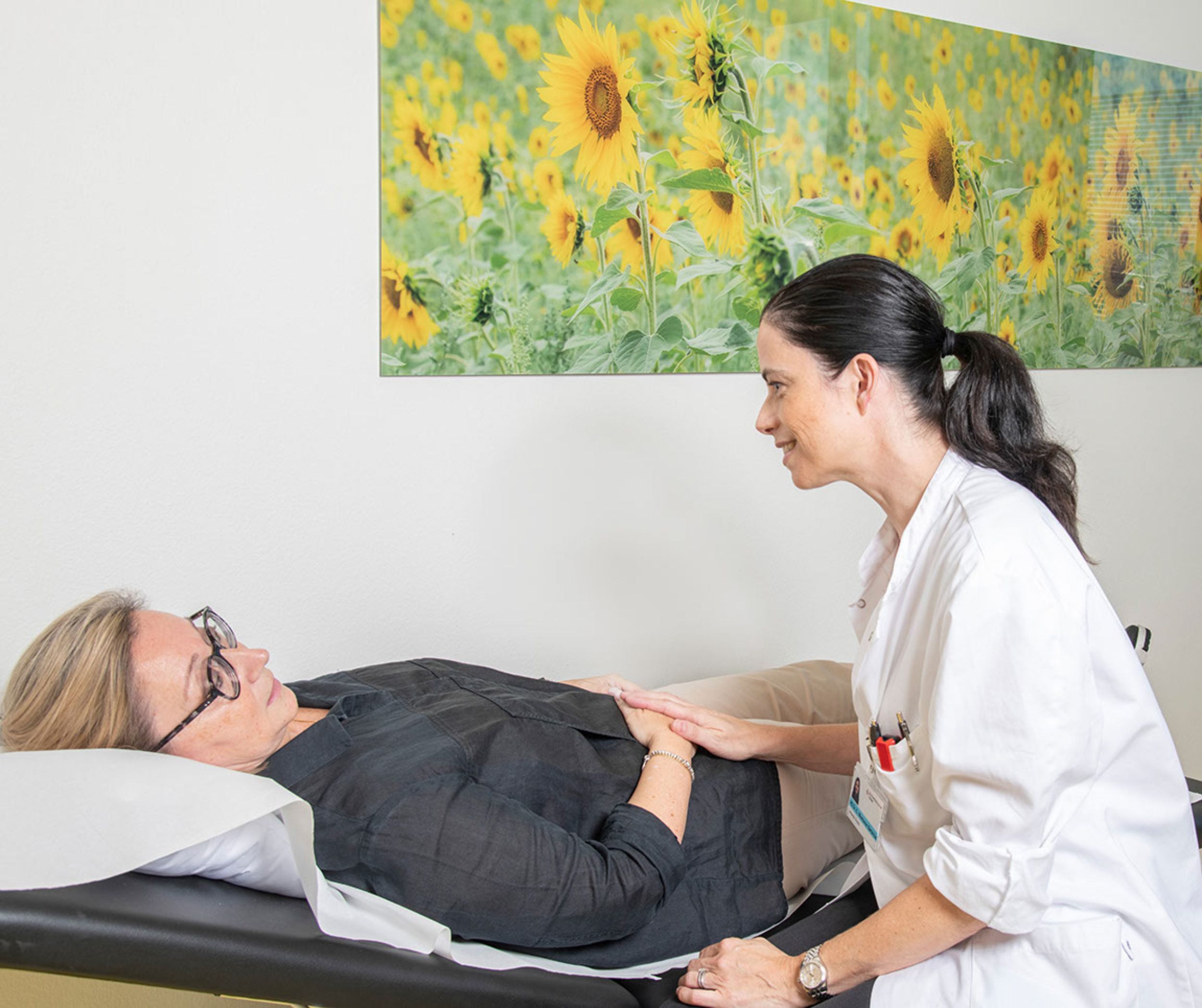
Gynecological Tumor Center
Cancer is a complex disease - its treatment is correspondingly comprehensive and specialized. The basic principle is always the maximum destruction of malignant tumor cells. At the same time, side effects and any long-term consequences are taken into account in order to achieve the best possible long-term quality of life. In order to achieve this balance, our credo for treatment is: as much as necessary - as little as possible.
Our focus is not only on a medical level, but also on a psychological level: a tumor often awakens fundamental fears and doubts in affected women. At the Gynaecological Tumor Centre, we use the various approaches made possible by the interdisciplinary nature of a center and tackle gynaecological tumors in a comprehensive and sustainable manner. We make ourselves strong in the fight against tumors, and we make women strong in the process.
Frequently asked questions about cancer of the female genitalia
How does radiation therapy for vulvar tumors affect the genital area? - Diana Cascais
It itches and burns in the genital area. Could it be cancer or a precancerous condition? - Dr. Dorothy Huang
Vulvar cancer: How can it develop and why is it not noticed? - Prof. Viola Heinzelmann
Will I be cured by the operation? - PD Dr. Celine Montavon
Why should I see a psycho-oncologist? - Dr. phil. Corinne Urech
Frequently asked questions about cancer of the female genitalia
How does radiation therapy for vulvar tumors affect the genital area? - Diana Cascais
It itches and burns in the genital area. Could it be cancer or a precancerous condition? - Dr. Dorothy Huang
Vulvar cancer: How can it develop and why is it not noticed? - Prof. Viola Heinzelmann
Will I be cured by the operation? - PD Dr. Celine Montavon
Why should I see a psycho-oncologist? - Dr. phil. Corinne Urech
Genetic counseling
Genetic counseling is a special consultation for the early detection and prevention of breast cancer or ovarian cancer. This can be particularly helpful if close relatives of yours have already been diagnosed with one of these forms of cancer. Below you will find information on frequently asked questions:
What does genetic testing mean?
A person's genes can be seen as a kind of "cookbook" for our body. They provide our cells with information about how various proteins are made and therefore determine how our body should look and function. However, sometimes the genes have mutations, which leads to the production of proteins changing. These mutations or errors can lead to someone having a particularly high risk of a disease. Genetic testing is an examination method that can be used to find out whether someone carries a certain risk gene.
Registration
Registration
Phone +41 61 265 93 33
gyn.genetik@usb.ch
Online registration
Cancer League Basel
Appointment management
Telephone registration
University Hospital Basel, Breast Diagnostics Radiology
Monday to Friday, 08:00-12:00 and 13:00-17:00
Phone +41 61 265 91 50
Which genes influence the risk of breast and ovarian cancer?
There are two genes that particularly influence the personal risk of breast or ovarian cancer. These genes are BRCA1 and BRCA2, also known as "breast cancer" genes 1 and 2. Women who have mutations in both of these genes have a particularly high risk of breast or ovarian cancer. Men with one of these mutations also have an increased risk of breast cancer. In addition to breast and ovarian cancer, prostate and pancreatic cancer can also occur in people with these gene mutations.
Who is genetic testing recommended for?
Genes are passed on from one generation to the next. Genetic testing is therefore particularly recommended for women whose close relatives have breast, ovarian, prostate or pancreatic cancer to find out whether they have abnormal forms of the breast cancer genes. In particular, genetic testing can be useful if two or more close relatives have breast or ovarian cancer, especially if one relative has both breast and ovarian cancer, or if these forms of cancer occur in more than one generation of the family.
However, a conspicuous accumulation of tumors in the family does not always mean that abnormal genes are the cause of the diseases.
What should be done before genetic testing?
Make sure you seek professional advice before undergoing genetic testing. During such a consultation, you will find out what the results could mean for you and your family. We will also support you sensitively in dealing with any feelings that may arise.
What does a positive test mean?
Not every person who has a genetic mutation will necessarily develop cancer. Knowing that you carry a gene mutation can be alarming, but it can also provide certainty and security. In particular, there are ways to significantly reduce the risk of developing cancer by taking preventive measures.
How can the risk of developing cancer be reduced?
Regular special screening examinations and gynaecological check-ups help to detect cancer at an early stage and therefore make it easier to treat. In addition, taking certain medication over a defined period of time can serve as protection against the disease. Prophylactic operations such as the removal of both ovaries and fallopian tubes and possibly the breasts can also be considered. The choice of measures depends on your age and situation and we will be happy to advise you sensitively on these options.
Management

Prof. Dr. med. Dr. phil. nat. Karl Heinimann
Stv. Ärztlicher Leiter
Medizinische Genetik
Leitung Labor Molekulargenetik
Team

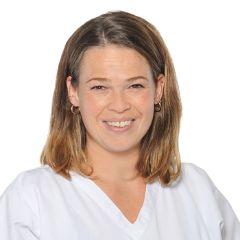

Contact us
Phone +41 61 265 93 33
Fax +41 61 265 90 37
gyn.genetik@usb.ch
Diagnoses
There are various gynaecological tumors that can affect both the internal and external sexual characteristics of women. Some of these gynecological diseases occur predominantly in older women, while others can also occur in women of a younger age and are favored by hereditary predisposition, lifestyle and other factors.
We treat patients with the following tumor diseases:
Ovarian or fallopian tube cancer (ovarian and tubal cancer)
This type of cancer usually only occurs at an older age, but younger women can also develop it. Ovarian or fallopian tube cancer usually causes no symptoms at first and is therefore rarely detected early. Initial symptoms may include
- A feeling of fullness and indigestion
- Unusual menstrual irregularities
- Bloody discharge between periods or after the menopause
- In advanced stages: swelling of the abdomen due to water retention
Cancer of the uterus (endometrial cancer)
This type of cancer usually only occurs after the menopause. The first signs may be unusual, irregular or unusually heavy bleeding. Regular ultrasound examinations of the uterine cavity can usually detect the disease at an early stage.
Cervical cancer (cervical carcinoma)
Cancer screening by means of a cell smear, also known as a Pap smear, enables early detection of this type of cancer. Early treatment can prevent the development of cancer in many cases.
Advanced cervical cancer often manifests itself through the following symptoms:
- Irregular bleeding, e.g. after sexual intercourse
- Bleeding after sporting activities such as cycling, horse riding etc.
Peritoneal cancer (peritoneal carcinoma)
The origin of this type of cancer lies outside the ovaries, but the characteristics of the tumor are similar to those of ovarian cancer.
Vaginal cancer (vaginal carcinoma)
Vaginal cancer is a rare type of cancer that usually only causes symptoms in the advanced stages of the disease. The first signs are increased vaginal discharge or unusual intermenstrual bleeding. However, such symptoms can also have harmless causes, which is why it is always advisable to consult a specialist. Other symptoms include difficult urination or pain in the back and legs if the nerve roots on the spinal cord are affected.
Cancer of the vulva (vulvar carcinoma)
This type of cancer mainly affects women after the menopause. The most common symptoms are itching and any hardening or spots in the labia area.
Treatment
Every cancer is different. The treatment options are correspondingly diverse. Together with other specialist areas, we create an individual therapy combination for each patient and constantly adapt it. The aim is to destroy cancer cells (curative) or delay their growth (palliative).
We offer a holistic range of therapies. In addition to surgery, chemotherapy and radiotherapy, supportive services such as psycho-oncology and complementary medicine can be of great benefit to the patient's well-being. We also offer various platforms for exchanging ideas and coping with any side effects, such as the women's café or the "Look Good, Feel Better" make-up course.
For treatment, we use the various procedures alone or in combination. The individual treatment steps can be carried out simultaneously or one after the other.
Operation
If the suspicion of a gynaecological tumor is confirmed, the first step in treatment is usually surgery. The aim is always to remove the tumor as far as possible while maintaining the best possible quality of life. Such operations are carried out by specially trained gynecological oncologists. The specialists can examine the tumor using a tissue sample during the procedure and initiate the appropriate treatment steps.
Chemotherapy
During chemotherapy, patients receive medication that inhibits the division of cancer cells and thus their growth. The medication is usually administered by infusion in a predefined number of cycles and at predefined intervals.
Chemotherapy can be used before an operation to shrink the tumor and thus improve the chances of success of the operation. After surgery and/or radiotherapy, chemotherapy is used to kill any remaining tumor. It can also be used for long-term aftercare and to improve quality of life.
Depending on the required dose and composition, the drugs not only attack cancer cells but also healthy cells - especially those that divide quickly. These include the cells of the hair roots, the intestinal mucosa and blood cells. This can lead to side effects such as hair loss, nausea and diarrhea. However, additional medication can alleviate or even prevent these side effects.
Radiotherapy
In this treatment, high-energy rays are directed at the tumor. These damage the cancer cells - they can no longer divide and die. The intensity and frequency of the radiation depends on the cancer and the treatment.
Similar to chemotherapy, radiation can also affect healthy cells. This can lead to temporary side effects and discomfort - but unlike the cancer cells, the healthy cells largely recover.
Immunotherapy
In addition to the three mainstays of surgery, chemotherapy and radiotherapy, cancer immunotherapy is becoming increasingly important and is therefore the subject of intensive research. Research into this therapy focuses on reactivating T-cells that have been exhausted by cancer cells. The aim is to mobilize the body's own defences, which in combination with other therapies can lead to better chances of recovery.
In 2015, the Tumor Center of the University Hospital founded a competence network for immunotherapy in order to pool specific knowledge in this area and thus use it to make suitable treatment decisions.
Complementary medicine
Certain complementary medicine services can help to improve quality of life in addition to treatments during or after cancer therapy. These types of therapy are not aimed at curing cancer, but acupuncture and massages, for example, can increase general well-being and thus have a supportive effect.
Complementary medical treatments can be selected in such a way that they alleviate symptoms or side effects without reducing the chances of a cure.
Complementary and integrative medicine consultation
In a one-to-one consultation, we focus on your personal needs and wishes and work together to create an individual, holistic treatment concept. We focus on helping to shape the healing process, activating your self-healing powers and your immune system and improving your quality of life. When choosing complementary methods, we pay particular attention to possible interactions with conventional medicine. We specialize in the following areas: Acupuncture / Traditional Chinese Medicine, Hypnotherapy / Mind-Body Medicine / Order Therapy, Nutrition and Exercise Therapy, Yoga, Energetic Massage and Aromatherapy.
Contact
Dr. Isabell Ge
Senior physician for complementary medicine
Innovation focus "Women's cancers"
Psycho-oncology
The gynecological tumor center offers you - in addition to medical therapy - targeted psycho-oncological care. In the form of counseling, we support you in finding your emotional balance, security and orientation again and in dealing better with worries and fears. You can take advantage of this support both during your inpatient stay and during outpatient aftercare.
Aftercare
Tumor aftercare takes place every 3 months for 2 years, then every 6 months until 5 years and then annually until 10 years. Patients are then discharged from tumor aftercare. Patients receive a follow-up care pass and are cared for jointly/alternately with the attending gynecologist, oncologist or family doctor whenever possible.
Nursing care at the Gynecological Tumor Center
A tumor in the genital area can be accompanied by many stressful feelings such as fear, worry or shame. We specialize in related issues and support patients throughout the entire disease process, from diagnosis to the time of tumour aftercare. We offer well-founded advice on the effects and symptoms of the therapies and talk to those affected about any changes in body perception following an operation. Concerns, uncertainties and questions about the rehabilitation of female sexuality can be discussed in a care-led consultation. The consultation is supplemented by a telephone consultation with our nursing expert APN (= Advanced Practice Nurse).
Gynecological diseases are sometimes accompanied by bladder emptying disorders and involuntary loss of urine. Our ANP continence management nursing expert specializes in related issues and supports patients and relatives on topics such as coping with everyday life, incontinence materials, leisure and travel, and much more.
Supporting offers
Consultation hours for complementary and integrative medicine
In a one-to-one consultation, we focus on your personal needs and wishes and work together to create an individual, holistic treatment concept. We focus on helping to shape the healing process, activating your self-healing powers and your immune system and improving your quality of life. When choosing complementary methods, we pay particular attention to possible interactions with conventional medicine. We specialize in the following areas: Acupuncture / Traditional Chinese Medicine, Hypnotherapy / Mind-Body Medicine / Order Therapy, Nutrition and Exercise Therapy, Yoga, Energetic Massage and Aromatherapy.

Nursing support
We nursing experts will be happy to advise and support you if you have pelvic cancer. We will answer your questions about the effects of the disease and its treatment. Our services include advice on dealing with symptoms caused by the cancer and side effects of the therapy, especially during and after radiotherapy, advice on skin care and dealing with scars, support with changes in body imageWe also offer support with changes in body image, counseling in cases of uncertainty or emotional stress, in dealing with changes in sexuality and rehabilitation measures, as well as support in developing strategies for coping with everyday life
Cosmetics, massage, energetic counseling
People who undergo chemotherapy often suffer from the consequences. They are not always visible to everyone, hardly anyone notices nausea or tiredness, but the Look Good Feel Better beauty workshop takes care of the visible consequences.
Yoga
Yoga has a very complex effect and can help to restore inner balance. The aim is to alleviate the side effects during ongoing oncological therapy and also after treatment has been completed. For example, yoga can provide valuable support in cases of exhaustion, sleep disorders, anxiety, depression, mood swings or menopausal complaints.
Yoga is practiced in the tradition of Desikachar (Viniyoga) and is individually tailored to the abilities and needs of the participant. Physical limitations are no obstacle to participating in the group classes. Previous experience with yoga is not necessary.

Look Good Feel Better
People undergoing chemotherapy often suffer from the consequences. They are not always visible to everyone, hardly anyone notices nausea or tiredness. However, the Look Good Feel Better beauty workshop takes care of the visible consequences.
Look Good Feel Better
People undergoing chemotherapy often suffer from the consequences. They are not always visible to everyone, hardly anyone notices nausea or tiredness. However, the Look Good Feel Better beauty workshop takes care of the visible consequences.
Management
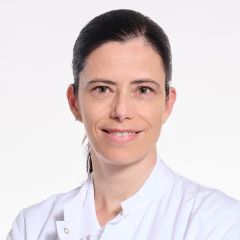
PD Dr. Céline Montavon Sartorius
Leitende Ärztin
Gyn. Onkologie, Leiterin Gynäkologisches Tumorzentrum
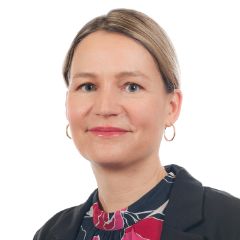
Center coordination
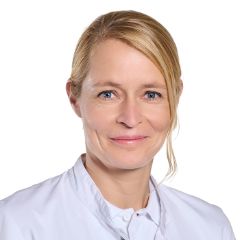
PD Dr. Fabienne Schwab
Kaderärztin
Brustklinik und Gyn. Onkologie
Gynäkologische Onkologie und Senologie
Management body

Prof. Daniel Boll
Stv. Chefarzt Radiologie und Nuklearmedizin
Leitung abdominelle und onkologische Diagnostik, med. Dienstleistung
Tel. +41 61 328 63 84

Dr. Anna-Lena Eberhardt
Kaderärztin
Radioonkologie und Strahlentherapie FMH
Kernteamleitung Basler Brustzentrum, Leitungsgremium gynäkologisches Tumorzentrum


Prof. Dr. med. Dr. phil. nat. Karl Heinimann
Stv. Ärztlicher Leiter
Medizinische Genetik
Leitung Labor Molekulargenetik
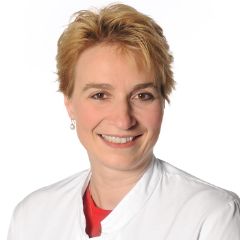
Prof. Viola Heinzelmann-Schwarz
Co-Leiterin Frauenklinik
Chefärztin Gynäkologie/Gyn. Onkologie



